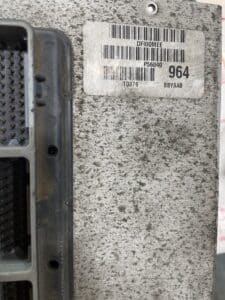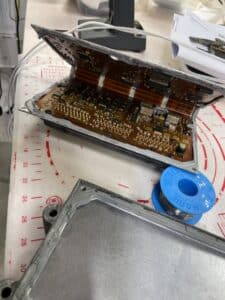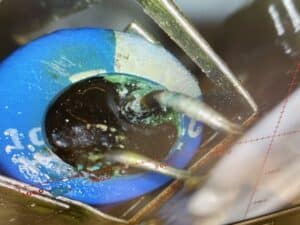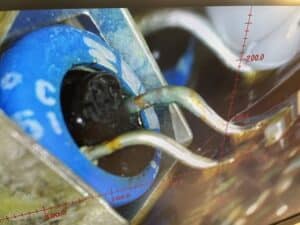You’re looking at an automotive ECU (Engine Control Unit) — the “computer” that controls key functions of a vehicle’s engine and sometimes transmission.
- The label shows identifying codes (e.g. DF10DMEE, P56040, 964, T0876) typically used by the manufacturer or parts supplier to identify this specific ECU model.
- The connector section on the left is where the ECU plugs into the vehicle’s wiring harness.

- This is the inside of the ECU, which you’ve opened. It shows the multi-layered PCB (printed circuit board) with various components such as:
- Microcontrollers and ICs
- Soldered connectors and pins
- Epoxy-sealed sections to protect against moisture and vibration

This specific unit appears to be from a Chrysler/Dodge/Jeep vehicle, based on the P56040 part number (commonly seen on Chrysler ECUs).
We checked that connector pin assignments follow the standard NGC pinout layout for 4‑connector ECMs labeled C1, C2, C3, and C4 which covers:
- Injector and ignition coil controls
- Sensor inputs (e.g. MAP, ECT, TPS, oil & ambient temperature)
- SCI & PCI communication lines
- Output control for A/C, purge valves, solenoids, relays, speed sensors, etc.
Summary of C1–C4 Connector Functions (NGC module):
| Connector | Key Functions |
| C1 | Ignition‑switch power, coil+injector controls, SCI comms, power & ground |
| C2 | More coil/injector channels, TPS, IAT/MAP/ECT signals, IAC control |
| C3 | Evap purge, AC clutch, various relay outputs, brake switch + fuel level |
| C4 | Transmission solenoids/switche senses and speed sensors (if TCM wiring integrated) |
Common Issues with ECUs:
-
No communication via OBD2
-
Random stalling or no-start condition
-
Corrupted or failed flash memory
-
Power stage/component failure
Repair vs Replace
| Factor | ECU P56040 Repair | ECU Replacement |
|---|---|---|
| Cost | ~$600 (NZD) | ~$1800 new or remanufactured |
| Turnaround Time | 2–5 days (repair service) | Long lead time if part not in stock |
| VIN/Immobilizer Matching | Usually retained during repair | Reprogramming may be required |
| Availability | Available if repairable | Used modules may be available |
| Success Rate | High for common faults | – |
When Repair Is Worth It
-
The fault is known (e.g. no comms, failed power rail)
-
The module is original and VIN-matched
-
Replacement stock is expensive or unavailable
-
You’re working with a trusted ECU repair technician like Device Repair Guy in Wellington!
When Not Worth It
-
Heavy water damage or burnt PCB
-
Internal MCU or eMMC is corrupt beyond repair
-
Car is being scrapped or not worth further investment
If the ECU shows classic repairable faults (e.g. dead comms, corrupted data, minor circuit failure) and the vehicle is otherwise in good condition, then repairing the UCE is often worth it — especially if the ECU is not easily replaced or reprogrammed.
In our case, the capacitors related to the power rail were damaged due to moisture ingress. Relatively easy repair, made harder somewhat by the fact that the whole unit is built with aluminum case that can be bent open only so many times before snapping and the fact that the circuit is made on Flex PCB, less robust and harder to work on.


